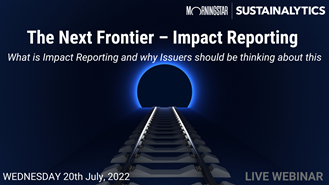ESG Risks Affecting Data Centers: Why Water Resource Use Matters to Investors
Data centers play a critical role for many technology and telecom companies and for their supporting servers, digital storage equipment and network infrastructure for data processing and storage. Data centers require high volumes of water directly for cooling purposes and indirectly, through electricity generation. Morningstar Sustainalytics’ recent activation of the Resource Use Material ESG Issue (MEI) within its ESG Risk Ratings recognizes water risks of data centers.
Governance in Brief – August 18, 2022
HSBC pressured to spin off its Asia business Hong Kong-based investor Ping An, which holds an 8.3% stake in HSBC, continues to pressure the lender to spin off its Asia business. The investor first advanced the idea in April 2022, but was at that point rebuffed by HSBC’s leadership.
Impact of US Supreme Court’s EPA Ruling on US Utilities’ Carbon Exposure
The Clean Power Plan was created using a directive from the Clean Air Act that enabled the EPA to set emission limits for air pollutants based on the best available technology to reduce emissions. The EPA aimed to cap carbon emissions and curb greenhouse (GHG) emissions by changing the composition of the existing operational power generation assets by forcing the closure of coal plants through strict emission caps, resulting in a system-wide transition to renewable energy.
Governance in Brief – August 11, 2022
At Tesla AGM, ESG proposals fall short of goal line Tesla’s August 4, 2022, AGM rejected seven shareholder proposals addressing: reporting on anti-harassment and discrimination efforts, board diversity reporting, employee arbitration, lobbying reporting, freedom of association and collective bargaining, child labour reporting, and water risk reporting.
What’s Happening in Sustainable Finance: The Shifting Regulatory Landscape, Reporting on Impact, Focus on Biodiversity, and More
In this month’s rundown of all things sustainable finance, we look at shifting regulations for investors, issuers and service providers, how issuers can measure the impact of their GSSS bonds, and the growing spotlight on biodiversity in financial markets.
Governance in Brief – August 4, 2022
Alibaba plans primary listing in Hong Kong Alibaba Group will apply for a primary listing in Hong Kong, with the process expected to be completed by the end of this year. Currently, the Chinese tech giant has a primary listing in the US and a secondary listing on the Hong Kong Stock Exchange.
The Next Frontier - Impact Reporting
The increasing urgency of the climate crisis has resulted in most investors demanding for more information about the extent to which their investments and portfolios are aligned with the 2°C Paris Agreement target. A recent Environmental Finance Report indicated that 90% of investors regard impact reports as ‘crucial’ and yet 75% of them said that current impact reporting practices are ‘inadequate’ and the lack of impact reporting deterred them from making further investments.
Why ESG Investors Follow the Elon Musk Twitter Takeover
A self-proclaimed “free speech absolutist”, Musk has criticized what he views as excessive moderation on online platforms, indicating his desire to ease Twitter’s content moderation policies and only remove content deemed illegal by governments.
Governance in Brief – July 28, 2022
German government bails out gas supplier Uniper amid energy crisis The German government has agreed to bail out gas importer Uniper in a deal worth EUR 15 billion. Faced with reduced gas flows from Russia and soaring energy prices, the company had recently asked the government for financial support, making use of newly adopted legislation allowing energy companies to receive support from the government.
How Blockchain Technology can Unlock Climate Solutions
In this year’s recent thematic research report by Sustainalytics, An ESG Lens on Blockchain and Public Equities, we assessed how a small but growing number of companies in resource-intensive industries, such as utilities, mining and semiconductor manufacturing, are developing blockchain solutions as part of their strategy to address environmental risks related to carbon emissions, water withdrawal, and responsible sourcing.
Ocean Carriers Facing Increased ESG Risk Amidst Supply Chain Crisis
Maritime shipping is the most common mode of transport for global trade, with around 80-90% of the volume of international trade in goods carried by sea. Complex supply chain challenges around the world made 2021 an exceptionally challenging year for retailers, exacerbating global inflation. Still, it was also very profitable for ocean carriers and containership owners.
The Sustainalytics Podcast | Aligning Executive Action to Strategy With Sustainability-Linked Compensation
Learn about how tying executive compensation to ESG performance can enhance a company’s accountability and transparency, the challenges organizations are facing, the types of metrics firms use for ESG-linked compensation programs, industries and regions with high pay-link adoption, steps to make your company’s program credible and transparent, and more.
Cobalt ESG Risks Threaten Electric Vehicle Supply Chain
Transport electrification is at the forefront of the international climate transition agenda. Because of this, global demand for cobalt is projected to grow fourfold by 2030, which raises the question, are mineral supply chains robust enough to fuel a sustainable EV revolution?
How Europe’s Energy Crisis Impacts the Clean Energy Transition
Europe is facing two major crises—an energy crisis, worsened by Russian energy supply disruptions and the challenge of tackling climate change. Renewables have the potential to accelerate EU's energy independence and reduce emissions. Still, there is also an urgent need to secure an adequate energy supply, especially in the coming winter months when heating demand increases. In the short-term, many EU countries are turning to other fossil fuel producers in the Middle East OPEC+ and the US, as well as domestic coal production. For firms deciding which energy projects to invest in, they face a complex question: are energy supply disruptions advancing the EU’s transition to a lower-carbon economy and its energy independence or furthering the continent’s dependence on fossil fuels?
Correlation of Business Ethics and Corporate Culture - 5 Lessons from the Banking Industry
To protect a company’s reputation and economic position, its employees play an essential part in organisational risk mitigation strategy by demonstrating consideration for systemic business risk, taking accountability, and being willing to escalate concerns. Companies with a strong, ethical corporate culture have much to gain—improved employee performance, morale, and retention, and in the long run, bolstering the bottom line.















